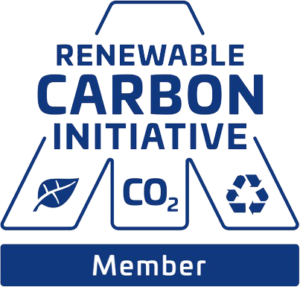When manufacturers make sustainable products, they often seek certifications and labels that boost customers’ confidence in their product claims.
Reliable certifications help eliminate the risk of greenwashing accusations, but it can be difficult to navigate the wide range of certifications available. If you work for a company that is formulating a product based on renewable carbon – including captured carbon – you may be wondering what options are available. Which labels appeal most to customers within your sector? Are some certifications more credible than others? What are the requirements?
There are several certification schemes that are suitable for products made with captured carbon:
- ISCC +
- OK Renewable Carbon
- RSB Advanced Products
In this article, we will review each and walk through key factors to consider.
ISCC+
Today ISCC+ is rapidly becoming the most recognized and adopted certification for products made of renewable carbon. For materials based on CCU processes, ISCC+ includes CO2 sources from biogenic CO2, atmospheric CO2 from direct air capture, and fossil (post-industrial) CO2 captured from industrial processes.
ISCC+ is well aligned with existing and upcoming regulations as well as positions outlined by major industry players. For example, ISCC+ is in harmony with:
- the EU’s Renewable Energy Directive (RED II)
- the Green Claims Directive
- the EU’s forthcoming Digital Product Passports (DPPs), part of the Ecodesign for Sustainable Products Regulation
It is also aligned with widely accepted industry positions outlined in publications such as the Europe Industry View Paper (2020) and Position Paper Cefic (2020).
Accreditation with ISCC+ requires a life cycle assessment (LCA) for the manufacturing process. Cradle to Gate is sufficient. However, manufacturers should note that the LCA used to obtain certification must have been conducted for the region where the product is manufactured. For example, if a Chinese manufacturer is licensing process technology from a European company, the Chinese manufacturer could not obtain ISCC+ with an LCA based on EU figures.
Provided all information is available, the time to achieve accreditation is about two months.
One potential drawback of ISCC+ is cost. The cost of certification is calculated based on a company’s total annual turnover. There is also a variable fee related to product volumes for the certified product or products.
Still, there is considerable upside to the ISCC+ certification when it comes to substantiating sustainability claims for products based on carbon capture and utilization.
OK Renewable Carbon
OK Renewable Carbon is a new certification commissioned by the Renewable Carbon Initiative (RCI). Designed by nova-Institute together with TÜV AUSTRIA the certificate shows the extent to which substitution of fossil-based raw materials has been achieved at the product level. It covers materials produced with a range of renewable carbon feedstocks.
The certificate and label indicate what percentage of the carbon in the product already consists of renewable carbon or has been substituted in the production process. This is the sum of bio-based, CO₂-based and recycled carbon.
According to RCI, “OK Renewable Carbon” is a so-called meta-label that builds on other established certificates and combines them into a new label.
This label has yet to be officially launched but is the first of its kind to be able to certify products made from a number of different renewable carbon sources.
TÜV AUSTRIA carries out the certifications and will be the only body authorised to do so.
RSB Advanced Products
The Roundtable on Sustainable Biomaterials Association, also known as RSB, also offers a certification that may be relevant for products made with renewable carbon. Like ISCC+, certification requires that all materials in the supply chain are RSB certified. It covers social as well as environmental practices.
This scheme enables the certification of non-energy products like plastics, textiles, and other products based on:
- Bio-based feedstocks
- Recycled carbon
- Production systems that process bio-based feedstock, or non-bio-based end-of-life products, or production residues in combination with virgin fossil feedstocks
The RSB bio-based certification is well recognised however the recycled carbon certification is less commonly seen. The organization is recognized within the aviation and marine sectors, but not yet widely adopted within the chemical industry.
For more information, visit the RSB website.
Would you like to talk to our team about labels and certifications? Please email us at contactus@econic-technologies.com.


